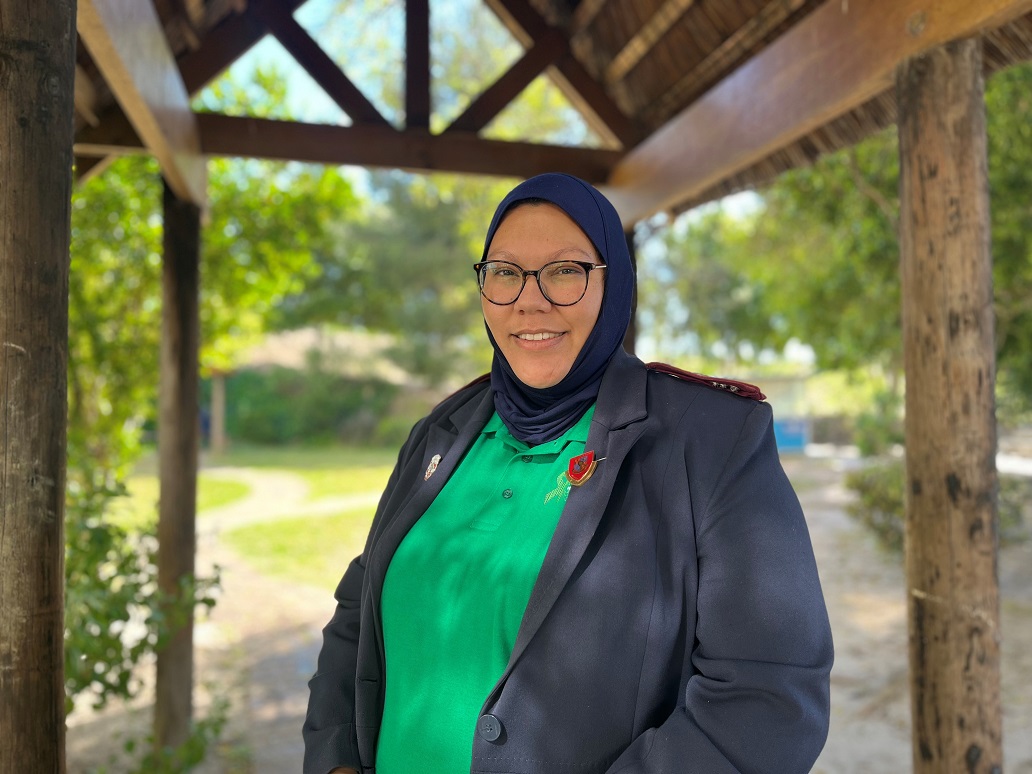
News
"Mental wellness begins in childhood": Nurse encourages mental wellness for all
"Mental wellness begins in childhood": Nurse encourages mental wellness for young and old
The World Health Organisation defines mental health or wellness as, “a state of well-being in which an individual realises his or her own abilities, can cope with the normal stresses of life, can work productively and is able to make a contribution to his or her community”.
Mental wellness is important at every stage of our lives, including childhood. Good mental health has many benefits, including allowing us to cope with everyday stresses and achieving our personal goals and dreams.
For the month of October, staff at Karl Bremer Hospital are wearing green to enhance awareness about mental wellness and the benefits of taking care of yourself. Sr Shazaadee Raciet is a specialist nurse with a passion for mental health. She believes that mental health is important as it allows us to think, emote, interact with each other, earn a living and enjoy life. She joined staff in wearing green and encourages all people to protect their mental wellness.
“Wearing the colour green is significant for mental health awareness. Research indicates that green symbolises harmony, tranquility, universal peace and fosters optimism, hopefulness and balance. It further indicates that the colour green enhances inner peace, represents new life and new growth. There is a growing body of evidence suggesting that the colour has positive effects on people’s mental well-being. We hope that by wearing green and speaking about mental wellness, we can empower our patients and the greater public.”
Sr Raciet’s passion for mental health care began at the start of her community service. “I have always been passionate about pursuing a career in nursing, with a focus on providing holistic care to assist people. During my community service year, I observed that there is a prevalent negative belief associated with mental health, leading to people avoiding seeking help or learning about mental wellness. It is important to find ways to protect your mental wellness through daily healthy habits and to start conversations about mental wellness with others.”
Sr Raciet believes that good mental wellness begins in childhood. “Mental health begins with ensuring good maternal-infant health, this means maintaining a strong bond between mother and child before delivery. It is also crucial to implement mental health education in early childhood development centres, educating both educators and parents to recognise early signs of impending mental health issues and how to design a curriculum that fosters mental well-being.”
Healthy habits for good mental wellness
There are many ways in which all of us can improve both our mental and physical health, not only for adults but for children as well. These healthy habits can help you and your children to cope with feelings of stress and anxiety. Especially important would be:
- Regular exercise as it can release feel-good brain chemicals; choose a programme or form of exercise that works for you and stick to it. Exercising doesn’t need to be expensive or lengthy or take up too much time in your day. Find something that makes you feel good and puts a smile on your face and your child’s.
- Choose a healthy diet. This should include plenty of fruits and vegetables, whole grains, a variety of protein foods, and low-fat dairy products. Do your best to avoid junk foods and fizzy drinks.
- Get enough sleep. A good night’s rest consists of 7-8 hours of quality sleep and do your best to maintain a regular sleeping pattern. Your sleep should be safeguarded at all costs, but especially during the times you are struggling with your mental wellness.
- Remain adherent to the treatment programme you and your health care provider have decided on. This means taking your medication and attending all sessions with your counsellor.
- Cut out unhealthy habits: Be aware of your alcohol intake and avoid tobacco products. Speak to a healthcare worker if you need support.
- Reach out to family and friends for mental health support. It is also critical to avoid using substances to self-medicate symptoms, more often this leads to worsening of symptoms or even development of new symptoms. If you are struggling, speak to someone your trust.
Sr Raciet says it’s also important to start conversations with your children about their mental wellness.
Some healthy habits to develop mental wellness in children:
- Talk: Talking about their mental wellness is important. Don’t wait for your children to come to you. If your child is sad, anxious, depressed or appears to be struggling – ask what’s wrong and offer your support.
- Pay attention: If your child’s behaviour changes, try and find out what may have happened and find ways to support your child. It is important to listen to their experiences.
- Monitor social media use: Talk about and monitor social media usage. If your child is hurt or upset about social media posts, encourage them to talk to you or a trusted family member or friend.
- Provide support: Talk to your children about treatment plans and monitor medication use. Be mindful of the words that you use and let them know that you are there to support them if they are struggling with their wellness.
In this way, you can build a safe space for your children to share their experiences and boost their wellness. In turn, this can help your child develop socially, emotionally, mentally, and physically.
Know the signs
There is so much we can do to support adults and children and their mental health. Knowing the signs that someone needs help is important. “If a person exhibits unusual, strange, or aggressive behaviour that poses a danger to themselves and others, it is crucial to take your relative to the nearest day hospital. There, they will be assessed by a psychiatric mental health nurse or a medical officer (doctor) to determine if psychiatric intervention or other support is necessary,” shares Sr Raciet.
There are also various helplines where you can get support, these include:
- Lifeline Suicide Crisis Helpline – 0800 121 314 /0861 322 322
- SADAG – Toll-free number – 0800 567 567
- Adcock Ingram Helpline – 0800 708 090
- Akeso Psychiatric Response – 0861 435 787
- Childline – 0800 055 555 or 116
- Cipla 24hr Helpline – 0800 456 789
- Dr Reddy’s Helpline – 0800 212 223
Educating people about mental wellness and how to cope is a key part of Sr Raciet’s role. She shares that both caregivers and the patients require support. Healthcare facilities also offer information leaflets and other support to empower patients and families. “For instance, when a patient initially presents with a mental illness at the hospital, they should receive comprehensive health education regarding what to expect, the specific details of the presenting psychiatric illness and an opportunity for families to express their feelings and emotions. I’ve observed that providing this kind of health education and creating a comfortable space for families to engage in discussions reassures them and fosters better understanding.
Help is available to you
There are many ways to protect and improve your mental wellness. This includes self-awareness and understanding when your loved ones need support. “You need to practice self-awareness, having a clear understanding of your thoughts and behaviours. It is also important to find ways to take care of yourself. If you are struggling to cope, remember our clinics or day hospitals have trained mental health professionals who can support you. Our health care teams can help you to find healthy ways to cope to protect your well-being.”
She encourages people to seek help if they are struggling to cope. “Don’t be afraid to seek help at your local clinic. If we all share the same mindset, we can work together to create a stigma-free community. I also want to say this, it is essential for mental health users to continue taking their psychiatric treatment or medication. Don’t feel the need to stop, even if you’re feeling much better. If you experience any symptoms that worsen your condition or have concerns, consult with a professional. Utilise the resources that are readily available at community day hospitals. Remember you can make a difference. Offer support to families with relatives suffering from mental health illnesses, as it can be distressing for them as well. Even if it means simply lending an ear, it can make a difference!





